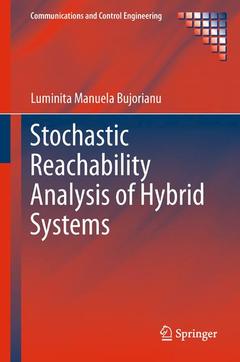Description
Stochastic Reachability Analysis of Hybrid Systems, 2012
Communications and Control Engineering Series
Author: Bujorianu Luminita Manuela
Language: English
Subject for Stochastic Reachability Analysis of Hybrid Systems:
Publication date: 04-2014
250 p. · 15.5x23.5 cm · Paperback
Publication date: 02-2012
250 p. · 15.5x23.5 cm · Paperback
Description
/li>Contents
/li>Biography
/li>Comment
/li>
Between June 2002 and January 2005, Doctor Bujorianu was a research associate in the Control Group, at the Department of Engineering at the University of Cambridge. After this appointment she remained in the Department as a research visitor for six months. During her appointment at Cambridge, she was involved in two European projects on hybrid systems: the IST-2001-38314 project COLUMBUS: “Design of Embedded Controllers for Safety Critical Systems” (partners: INRIA, University of Berkeley, PARADES (Rome), etc. http www.columbus.gr); and the IST-2001-32460 project HYBRIDGE: “Distributed Control and Stochastic Analysis of Hybrid Systems Supporting Safety Critical Real-Time Systems Design” (partners: National Aerospace Laboratory-NLR Amsterdam, BAE UK, Eurocontrol, AEA Technology, CENA, etc. http: www.nlr.nl/public/hosted-sites/hybridge) From November 2005 to June 2008 Doctor Bujorianu was a Research Associate with the Formal Methods and Tools Group at the Faculty of Mathematics and Computer Science, University of Twente, the Netherlands. Her research was funded by the NOW project AiSHA “Abstraction in Stochastic and Hybrid Process Algebra”. During her appointment with University of Twente, she was also involved in the German-Dutch project VOSS. Since June 2008 Manuela Bujorianu has been a Research Associate with the Centre for Interdisciplinary Computational and Dynamical Analysis (CICADA) at the University of Manchester in the UK.




